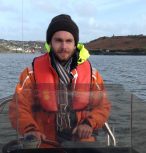DNA reveals the past and future of coral reefs
New DNA techniques are being used to understand how coral reacted to the end of the last ice age in order to better predict how they will cope with current changes to the climate. James Cook Univer

From 2005 to 2022, the main node of the ARC Centre of Excellence for Coral Reef Studies was headquartered at James Cook University in Townsville, Queensland (Australia)








Abstract: To have the greatest impact in marine conservation we must minimise threats to marine biodiversity. Marine protected areas (MPAs) are one of the mostly widely used tools to do this. However, the usefulness of MPA systems for mitigating broad-scale threats to marine ecosystems is questionable. This is because MPAs are often placed in areas that are “residual” to other activities, such as fishing and oil and gas extraction, in order to minimise conflict with stakeholders and to minimise opportunity costs. These activities are often the very activities threatening marine biodiversity, so how do we avoid residual conservation while still having an impact? One way to avoid this problem is by pre-emptively protecting areas that are not currently threatened, but that may be in the future (a proactive strategy). However, there is no evidence that this strategy is effective in the sea. The alternative is to protect areas that are immediately threatened (a reactive strategy), but this strategy incurs high opportunity costs. Here I will compare the effectiveness of a proactive and reactive strategy at protecting fish biodiversity on the coral reefs of Micronesia. Then, in light of this, I will measure the impact that existing MPA networks are having in relation to fishing and oil and gas extraction. I will then use this information to design a maximum-impact MPA network for Chuuk Lagoon, Micronesia.
Biography: Ed completed his undergraduate degree at the University of Queensland, where he majored in Zoology and Ecology, and later went on to study rare semi-aquatic plants. After spending some time working in the diving industry overseas, Ed returned to Australia to begin his PhD in the Conservation Planning Group under the supervision of Bob Pressey and Rebecca Weeks.
New DNA techniques are being used to understand how coral reacted to the end of the last ice age in order to better predict how they will cope with current changes to the climate. James Cook Univer
A new study on the effects of climate change in five tropical countries has found fisheries are in more trouble than agriculture, and poor people are in the most danger. Distinguished Profess
James Cook University researchers have found brightly coloured fish are becoming increasingly rare as coral declines, with the phenomenon likely to get worse in the future. Christopher Hemingson, a
Researchers working with stakeholders in the Great Barrier Reef region have come up with ideas on how groups responsible for looking after the reef can operate more effectively when the next bleaching
Abstract: As marine species adapt to climate change, their heat tolerance will likely be under strong selection. Individual variation in heat tolerance and its heritability underpin the potential fo
Abstract: The Reef Ecology Lab in KAUST’s Red Sea Research Center explores many aspects of movement ecology of marine organisms, ranging from adult migrations to intergenerational larval dispersal
Abstract: Macroalgal meadows are a prominent, yet often maligned component of the tropical seascape. Our work at Ningaloo reef in WA demonstrate that canopy forming macroalgae provide habitat for ad
Abstract: Sharks are generally perceived as strong and fearsome animals. With fossils dating back at least 420 million years, sharks are not only majestic top predators but they also outlived dinosa
Abstract: Connectivity plays a vital role in many ecosystems through its effects on fundamental ecological and evolutionary processes. Its consequences for populations and metapopulations have been
Abstract: Evolution of many eukaryotic organisms is affected by interactions with microbes. Microbial symbioses can ultimately reflect host’s diet, habitat range, and even body shape. However, how
Abstract: The past few years have seen unprecedented coral bleaching and mortality on the Great Barrier Reef (GBR) but the consequences of this on biodiversity are not yet known. This talk will expl